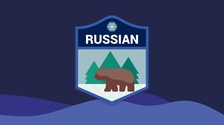寻找适合你的 英语 教师…
3215 人参与

#RussianLeague
3215 人参与
Welcome to the Russian Language League! Meet other learners, get advice and motivation, and be part of the Russian learning community.
#RussianLeague
Welcome to the Russian Language League! Meet other learners, get advice and motivation, and be part of the Russian learning community.
所有
展示更多

